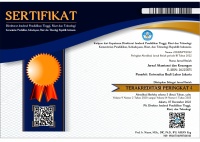The Hidden Meaning of Household Accounting Implementation Among Moslem Accountants
Abstract
Keywords: Accountability, Budgeting, Mental accounting, Locus of control, Household accounting
Keywords
Full Text:
PDFReferences
REFERENCES
Ajzen, I. (1991). The theory of planned behavior. Organization Behavior and Human Decision Process.
Ajzen, Icek. (2011). The theory of planned behaviour: Reactions and reflections. Psychology and Health, 26(9), 1113–1127. https://doi.org/10.1080/08870446.2011.613995
Allen, B. D. W. (1992). Marriage and Divorce : Comment Author ( s ): Douglas W . Allen Source : The American Economic Review , Jun ., 1992 , Vol . 82 , No . 3 ( Jun ., 1992 ), pp . 679- Published by : American Economic Association Stable URL : https://www.jstor.org/stable/211733. 82(3), 679–685.
Arthaud-day, M. L., & Near, J. P. (2005). The wealth of nations and the happiness of nations: Why “accounting” matters. Social Indicators Research, 74(3), 511–548. https://doi.org/10.1007/s11205-004-6397-8
Bartczak, A., Budziński, W., Chilton, S., McDonald, R., & Nielsen, J. S. (2021). Altruism and efficient allocations in three-generation households. Journal of Risk and Uncertainty, 62(2), 113–135. https://doi.org/10.1007/s11166-021-09350-z
BPS. (2020). Jumlah Nikah dan Cerai 2018-2020. https://jabar.bps.go.id/backend/images/Header-Frontend-Besar-ind.png
Carnegie, G. D., & Walker, S. P. (2007). Household accounting in Australia: Prescription and practice from the 1820s to the 1960s. Accounting, Auditing and Accountability Journal, 20(1), 41–73. https://doi.org/10.1108/09513570710731209
Creswell, J., & Tashakkori, A. (2007). Differing Perspectives on Mixed Methods Research Journal of Mixed Methods. Journal of Mixed Methods Research, 1(4), 303–308.
Creswell, J. W. (2016). Research Design, Pendekatan Metode Kualitatif, Kuantitaif, dan Campuran. Pustaka Pelajar.
Faridawati, R., & Silvy, M. (2019). Pengaruh niat berperilaku dan kecerdasan spiritual terhadap pengelolaan keuangan keluarga. Journal of Business & Banking, 7(1). https://doi.org/10.14414/jbb.v7i1.1465
Imamatin Listya Putri, S. I. (2022). Volume 3, No 2, Agustus 2022. Al Idarah, 3(2), 35–42.
Indonesia, R. (1974). Undang-Undang Tentang Perkawinan. Peraturan Pemerintah Republik Indonesia Nomor 1 Tahun 1974 Tentang Perkawinan, 1, 2.
Insani. N N, Suseno. N S, R. M. (2018). Mental Accounting dan Heuristik Dalam Pengelolaan Keuangan. Jurnal Wahana Akuntansi, 03 No. 2, 79–85.
Ismail, M. (2020). Hedonisme dan Pola Hidup Islam. Jurnal Ilmiah Islamic Resources, 16(2), 193. https://doi.org/10.33096/jiir.v16i2.21
Manurung, D. (2013). Urgensi Peran Akuntansi Dalam Rumah Tangga. Jurnal Ilmiah Akuntansi Dan Humanika, 892–911.
Masykurotus, Syarifah, dkk. (2019). Peranan Istri Dalam Mencari Nafkah Perspektif Hukum Islam (Studi Pemikiran Madzhab Syafi’iyah). Iqtisodina, 1, 27–62.
Mulyani, S., & Budiman, N. A. (2018). Pentingnya Akuntansi Rumah Tangga Dalam Meningkatkan Hidup Islami. Equilibrium: Jurnal Ekonomi Syariah, 6(2), 206. https://doi.org/10.21043/equilibrium.v6i2.3707
Musdalifa, E., & Mulawarman, A. D. (2019). Budaya Sibaliparriq Dalam Praktik Household Accounting. Jurnal Akuntansi Multiparadigma, 10(3), 413–432. https://doi.org/10.21776/ub.jamal.2019.10.3.24
Noviriani, E., Alrizwan, U. A., Mukaromah, L., & Zurmansyah, E. (2022). Pengelolaan Keuangan Rumah Tangga Dalam Sudut Pandang Perempuan. Jati: Jurnal Akuntansi Terapan Indonesia, 5(2), 155–168. https://doi.org/10.18196/jati.v5i2.16404
Nufaisa, & Jannah, B. S. (2020). BAJ ( Behavioral Accounting Journal ). Analisis Implementasi Pendidiakn Kewirausahan, 3(1), 1–14.
Otley, D. (2014). The contingency theory of management accounting and control : 1980 – 2014 David Otley The contingency theory of management accounting and control : Management Accounting Research, 1980–2014.
Pahl, J. (2000). Couples and their money: Patterns of accounting and accountability in the domestic economy. Accounting, Auditing & Accountability Journal, 13(4), 502–517. https://doi.org/10.1108/09513570010338078
Patton, M. Q. (1987). Qualitative Education Methods. Sage Publication.
Raharjo. (2015). Household Accounting Values and Implementation Interpretive Study ARIEF PRIMA RAHARJO* ARI KAMAYANTI. The Indonesian Journal of Accounting Research, 18(1).
Retnoningtyas, S., Tarmizi, M. I., Akuntansi, M., & Jakarta, U. M. (2022). Jurnal Akuntansi dan Keuangan Vol . 11 No . 2 Oktober 2022 FEB Universitas Budi Luhur. 11(2), 101–119.
Riyadi, R. (2016). Motivasi, Pengetahuan Akuntansi Dan Penerapan Akuntansi Terhadap Penggunaan Informasi Akuntansi. Akuntansi Dan Keuangan, 5(1), 80–95.
Rosalina, E., Rahim, R., Husni, T., & Alfarisi, F. (2021). Mental Budgeting dan Motivasi Terhadap Pengelolaan Keuangan Individu. Journal of Applied Accounting and Taxation, 6(2), 175–182. https://doi.org/10.30871/jaat.v6i2.3008
Rospitadewi, E., & Efferin, S. (2017). Mental Accounting dan Ilusi Kebahagiaan: Memahami Pikiran dan Implikasinya bagi Akuntansi. Jurnal Akuntansi Multiparadigma, 169. https://doi.org/10.18202/jamal.2017.04.7037
Rotter, J. B., Mulry, R, C. (1965). Internal versus external control of reinforcement and decision time. Journal of Personality and Social Psychology, 2, 598–604.
Rozzaki, A. D., & Yuliati, Y. (2022). Urgensi Penerapan Akuntansi Rumah Tangga Masa Pandemi Covid-19. JAS (Jurnal Akuntansi Syariah), 6(1), 69–82. https://doi.org/10.46367/jas.v6i1.601
Rudi Yulianto, A., & Syahputra, B. (2019). Pengaruh Tingkat Pendidikan, Pendapatan, Gender, Dan Tempat Tinggal Terhadap Akuntansi Rumah Tangga. Maksimum, 8(2), 77. https://doi.org/10.26714/mki.8.2.2018.77-85
Sofyan, B. (2018). Building a Sakinah Family. Al-Irsyad Al-Nafs, Jurnal Bimbingan Penyuluhan, 7(2), 1–14.
Suhakim, A. I., & Arisudhana, D. (2017). Pengaruh Gender, Locus of Control, Komitmen Profesi, dan Kesadaran Etis terhadap Perilaku Auditor dalam Situasi Konflik. Jurnal Akuntansi Dan Keuangan, 1(1), 38–57.
Thaler, R. H. (1999). Menta accounting matters. Journal of Behavioral Decision Making, 12(3), 183–206. https://doi.org/10.1002/(SICI)1099-0771(199909)12:3<183::AID-BDM318>3.0.CO;2-F
Thaler, R. H. (2008). Mental accounting and consumer choice. Marketing Science, 27(1), 15–25. https://doi.org/10.1287/mksc.1070.0330
The Holy Qur’an. (2021). The holy qur’ an. Islam International Publications Ltd.
Weiss, T. G. (2000). Governance, good governance and global governance: Conceptual and actual challenges. Third World Quarterly, 21(5), 795–814. https://doi.org/10.1080/713701075
Yuanita, E., & Suripto, B. (2022). Determinan Akuntabilitas Pengelolaan Keuangan Organisasi Nonlaba. Jurnal Reviu Akuntansi Dan Keuangan, 12(2), 438–455. https://doi.org/10.22219/jrak.v12i2.18674
Yulianti, M. (2016). Akuntansi dalam Rumah Tangga : Study Fenomenologi pada Akuntan dan Non Akuntan. Akuntansi Dan Manajemen, 11(2), 62–75. https://doi.org/10.30630/jam.v11i2.93
Zhang, C. Y., & Sussman, A. B. (2018a). Perspectives on mental accounting: An exploration of budgeting and investing. Financial Planning Review, 1(1–2), e1011. https://doi.org/10.1002/cfp2.1011
Zhang, C. Y., & Sussman, A. B. (2018b). The Role of Mental Accounting in Household Spending and Investing Decisions. Client Psychology, 19, 65–96. https://doi.org/10.1002/9781119440895.ch6
DOI: https://doi.org/10.36080/jak.v12i2.2242
Refbacks
- There are currently no refbacks.

This work is licensed under a Creative Commons Attribution 4.0 International License.
Fakultas Ekonomi dan Bisnis, Program Studi Akuntansi. Universitas Budi Luhur, Jl. Ciledug Raya, Petukangan Utara, Jakarta Selatan, DKI Jakarta 12260, Indonesia

This work is licensed under a Creative Commons Attribution 4.0 International License.












